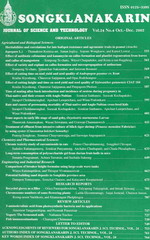ThaiScience
ThaiScience
SONGKLANAKARIN JOURNAL OF SCIENCE & TECHNOLOGY
Volume 42, No. 05, Month SEPTEMBER, Year 2020, Pages 967 - 974
Feasibility study of membrane preparation using polycarbonate from waste compact discs by phase separation
Diew Saijun and Watchanida Chinpa
Abstract Download PDF
Using non-solvent induced phase separation (NIPS), asymmetric porous membranes were prepared from polycarbonate (PC) derived from waste compact discs (CDs). The effects of recovered PC (PC-R) concentration (18-24 wt%) on the morphologies and mechanical and permeation properties were investigated. At all casting solution concentrations, PC-R membranes had asymmetric structures that consisted of a skin layer and a marcovoid sublayer. As the PC-R concentration increased, the macrovoid sublayer was suppressed as a sponge-like sublayer formed within the asymmetric structure. The tensile strength and elongation at break of membranes cast from solutions containing 20, 22, and 24 wt% PC-R ranged from 2.60 to 2.97 MPa and 7.69 to 11.45%, respectively. These values were sufficient to resist operating pressures during membrane filtration testing. The pure water flux through the membranes decreased as the PC-R concentration increased, whereas %R presented an inverse trend. These results indicated that PC recovered from waste compact discs could provide an alternative material for porous membrane fabrication.
Keywords
waste CDs, polycarbonate, membrane, phase inversionSONGKLANAKARIN JOURNAL OF SCIENCE & TECHNOLOGY
Published by : Prince of Songkla University
Contributions welcome at : http://rdo.psu.ac.th
